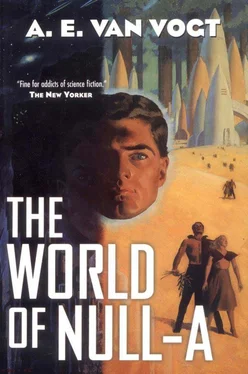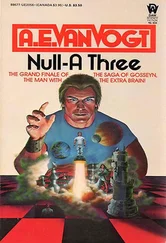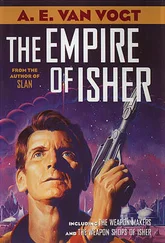Gosseyn grew aware that he was not the only overwrought person in the room. The two men, Hardie and the monstrosity, leaned forward in their chairs. Blue eyes and yellow-brown eyes glowed moistly avid. The girl sat crouched in her chair, her legs drawn up, one hand rigidly holding a cigarette to her lips. She puffed at it automatically, but she didn't inhale. She simply puffed the smoke into her mouth and then thrust it out again. She did that over and over.
Of the quartet, Thorson was the calmest. With steady fingers, he made some final adjustments on something in the machine that Gosseyn couldn't see, then looked questioningly at Michael Hardie. But it was Gosseyn who broke the silence, who said thickly, “I think you ought to listen to me for a moment.”
He paused, not because he was finished but because suddenly he felt desperate. He thought, What in the name of reason is going on here? This can't be happening to a law-abiding human being on the peaceful Earth of 2560 A.D.
“I feel,” he said, and his voice sounded husky in his own ears, “like a child in a madhouse. You want something from me. For logic's sake, tell me what, and I'll do my best for you.
“Naturally,” he went on, “I value my life more than any fact that you can possibly require of me. I can say that safely because in this world of null-A no individual matters to the extent that his ideas, his inventions, or his personality can be used to the detriment of mankind. Individual machines cannot sway the balance against the accumulated mass of science as employed by determined, courageous men in the defense of civilization. That has been proved. Unique science cannot win a war.” He gazed questioningly at Michael Hardie. “Is it anything like that? Any invention of my pre-amnesic days?”
“No.” The speaker was “X.” The cripple looked amused, and added, “You know, this is really interesting. Here is a man who knows neither his purpose nor his antecedents, and yet his appearance at this period cannot be quite accidental. The inability of the hotel lie detector to penetrate his true identity is an unheard-of phenomenon.”
“But he's telling the truth.” Patricia Hardie lowered her feet to the floor, and let her cigarette hand dangle. She looked and sounded very earnest. “The lie detector at the hotel said that his mind was not aware of his identity.”
A plastic arm waved at her patronizingly. The bass voice was tolerant.
“My dear young lady, I'm not questioning that it said that. But I'm not forgetting that machines are corruptible. The brilliant Mr. Crang, and I”–his voice grew significant–“have proved that to the satisfaction of many men, including your father.”
He broke off. “I don't think any statement Gosseyn makes, or that is made about him by ordinary brain-testing devices, can be accepted by us.”
President Hardie nodded. “He's right, Pat. Normally a man who falsely believed himself married to my daughter would be simply another psychoneurotic. However, the very appearance of such a man at this time would have to be investigated. But the inability of the hotel lie detector to identify him is so unnormal that, as you see”–he motioned–“even Thorson has become interested. My idea is that the Galactic League agents tossed him out for us to look at. Well, we're going to look. What are your plans, Jim?”
Thorson shrugged. “I want to break through the memory blocks and find out who he is.”
“X” said, “I don't think that the information we gain should be too widely known. Miss Hardie, leave the room.”
The girls lips tightened. “I prefer to stay,” she said. She tossed her head defiantly. “After all, I took risks.”
Nobody said anything. The half-man looked at her with eyes that, to Gosseyn, seemed implacable. Patricia Hardie stirred uneasily, then looked at her father as if for support. The great man evaded her gaze, twisting uncomfortably in his chair.
She got up, her lip curling. “So he's got you buffaloed, too,” she said with a sneer. “Well, don't think he scares me. I'll put a bullet into him one of these days that no surgeon will be able to put a plasto over.”
She went out, slamming the door behind her. Hardie said, “I don't believe we need waste any time.”
There were no objections. Gosseyn saw that Thorson's fingers were hovering over the power switch of the machine on the table. The moving fingers twisted powerfully. There was a click and a hum.
At first nothing happened. He was tensed to resist energy flows. And there weren't any. Blankly he watched the machine. It hummed and throbbed. Like so many devices, it had its own special electron tubes. Whether they were used for controlling the speed of unseen motors or for amplifying some obscure sound in his body or converting energy or timing changes in an invisible process, or for any one of a hundred other tasks, it was impossible for Gosseyn to decide.
Some of the tubes peeped brightly out of holes in an opaque, curving plastic instrument box. Others, he knew, were too sensitive to be exposed to anything so violent as the normal temperature and brightness of a room. They would be hidden deep in their little enclosures with only a minute fraction of their easily irritated glass-smooth forms connected with the outside.
Watching hurt his eyes. He kept blinking and the tears that resulted blurred his vision. With an effort, Gosseyn looked away from the table and its machines. The movement must have been too sudden for his strained nerves. Something banged inside his head and a violent headache began. He realized with a start that this was what the machine was doing to him.
It was as if he had sunk to the bottom of a pool of water. There seemed to be heavy pressure on him from every side, inside included. As from a great distance, he heard Thorson's calm voice lecturing his hearers.
“This is an interesting machine. It manufactures a variation of nervous energy. The energy is absorbed through the dozen nodes I have placed on Gosseyn's head and shoulders, and flows evenly along all the nerve paths that have been previously established in his body. It does not itself establish any new patterns. You must think of it as an impulse that rejects instantly the slightest difficulty. It– recoils from obstacles that vary by approximately one per cent from what to it is normal. It is a supreme adherent of the school of energies that follow the path of least resistance.”
It was hard, thinking against the sound of the voice. Gosseyn's mind couldn't form a complete thought. He strained against the blurring power of the voice and against the energy that was flowing through him. Nothing came but spasms of ideas and Thorson's voice.
“The medically interesting characteristic of this artificial flow of nervous energy is that it is photographable. In a few moments, as soon as the movement of artificial energy has penetrated the remotest easy paths, I'll obtain several negatives and make some positive prints. When enlarged in segments through a projector, the prints will show us in what parts of his brain his memory is concentrated. Since science has long known the nature of the memory stored in every cell group, we can then decide where to concentrate the pressures that will force the particular memory we want onto the verbal level.
“A further use of this machine, using more power and combined with a complicated word-association system-formula, will perform the actual operation.” He shut off the machine and pulled some film out of the camera. He said, “Watch him!” He disappeared through the nearest door.
Watching wasn't necessary. Gosseyn couldn't have stood steadily on his feet. His brain was turning rapidly in an illusion of spinning. Like a child that has whirled around and around too often, he had to unwind. Thorson was back before he could see straight.
Читать дальше










